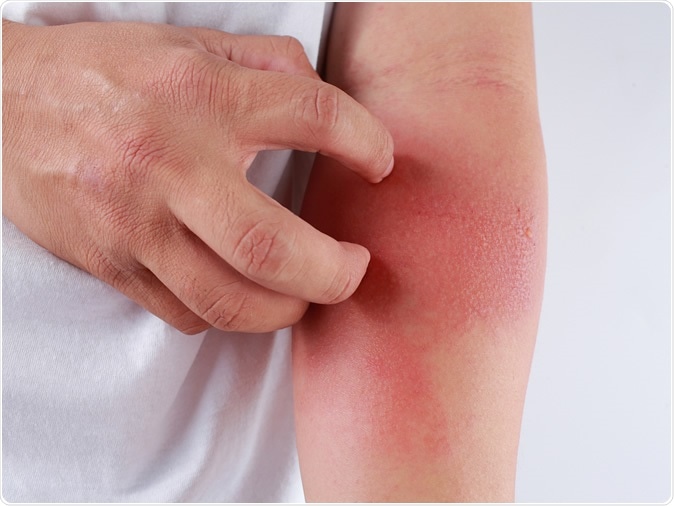A new drug regimen is reported to have marked benefits in treating the troublesome and distressing skin condition called eczema. The study, published in February 2020 in the journal Science Translational Medicine, shows that boosting the levels of a type of immune cell called natural killer cells can be a more effective way to treat eczema in a mouse study.
Furthermore, this could eventually lead to the development of therapies to counter other related atopic conditions as well, such as asthma, which is closely linked to eczema.
Eczema
Eczema is a kind of skin condition in which some or all of the skin breaks out with an itchy rash associated with raw weeping lesions. The underlying reason is abnormal and mistargeted inflammation due to an allergic reaction.

Eczema. Image Credit: TY Lim / Shutterstock
There is no cure for this condition, nor is it easily preventable. At various times, steroids for topical application, drugs that inhibit lymphocytes from proliferating (called calcineurin inhibitors), and a new biologic called dupilumab, which is a monoclonal antibody, have all been used to treat the rash, by suppressing one or other of the immunologic pathways in the body in either a broad or a more targeted manner.
However, none are universally effective, and several have serious side effects. For instance, says researcher Brian S. Kim, “Eczema is a chronic disease, and using steroids day in and day out is not advisable because it can contribute to thinning of the skin, which can contribute to other side effects. Long-term use can lead to easy bruising and even stretch marks on the skin. We need more reliable treatments to bring relief.”
Dupilumab acts in another way. It suppresses rather than stimulating immune function. Approved in 2017 for use in eczema patients, the drug is effective and safe, and has benefited many eczema patients, according to Kim. In most cases, the drug is administered by injection two times a month. Nonetheless, the effect is inadequate in up to 60% of patients who were in the trial. And not only was the efficacy less widespread than expected, but there were several instances in which the face showed a flare-up even while the lesions over the body showed improvement. Conjunctivitis and other adverse effects are also experienced in some cases.
Natural killer cells
Also called NK cells, natural killer cells are under investigation as a treatment for cancer. These cells are especially important in fighting foreign cells, including tumor cells that bear antigens, or molecules, not recognized by the body as part of its self.
The study
The researchers noticed that patients with eczema consistently had very low numbers of NK cells in their circulation. So consistently, indeed, that they began using them to crosscheck the diagnosis of eczema. In other words, if there was any doubt about the patient’s having eczema, one reliable way to check was to do a blood test and look at the NK levels.
The question was, why did this happen every time? To answer this, the researchers designed a mouse experiment. They used a mouse model of eczema and knocked out the ability of the mice to produce NK cells. This resulted in worsening – the levels of various markers of inflammation increased. They concluded that the deficiency of NK cells in mouse skin led to increased type 2 inflammation of skin tissues, because of the lack of an essential immunoregulatory step performed by NK cells.
Later on, they treated the animals with a new drug, an interleukin-15 (IL-15) superagonist that is still in the experimental stage and is being developed for the treatment of cancer. It works by increasing the number of NK cells.
Revving up immune system may help treat eczema
The results
Therapy with the IL-15 superagonist resulted in a significant improvement in symptoms as the inflammation resolved. The drug not only relieves the skin lesions of eczema but also restores the patient’s immune function against viral infections. It is already established that low NK cell levels make the person more liable to viruses such as pox, herpes, and even HIV.
In the current mouse study, the skin of the treated mice showed marked resolution of the skin lesions compared to any other therapy tried so far. The exciting thing for the researchers is that this may be a reflection of the human response to this therapy as well, because, according to Kim, “So far, our mouse model of eczema has accurately predicted what we would see in patients.”
Implications
Kim and his team are now looking at the possibility of partially enhancing immune function to help eczema patients achieve a more significant benefit. IL-15 superagonists, which increase the number of NK cells, are being tested out as part of a cancer drug trial. Since this effect seems to be selective, the researchers are trying to test their effect in a clinical trial that will focus on eczema.
Says Kim, “We have a patent-pending for this strategy, and we are planning to move toward trials,” he said. “And we will not limit our studies to eczema. This strategy could help patients who have asthma or food allergies, conditions that often appear along with eczema.”
Journal reference:
Blood natural killer cell deficiency reveals an immunotherapy strategy for atopic dermatitis, Madison R. Mack, Jonathan R. Brestoff, Melissa M. Berrien-Elliott, Anna M. Trier, Ting-Lin B. Yang, Matthew McCullen, Patrick L. Collins, Haixia Niu, Nancy D. Bodet, Julia A. Wagner, Eugene Park, Amy Z. Xu, Fang Wang, Rebecca Chibnall, M. Laurin Council, Carrie Heffington, Friederike Kreisel, David J. Margolis, David Sheinbein, Paola Lovato, Eric Vivier, Marina Cella, Marco Colonna, Wayne M. Yokoyama, Eugene M. Oltz, Todd A. Fehniger and Brian S. Kim, Science Translational Medicine, Vol. 12, Issue 532, eaay1005, DOI: 10.1126/scitranslmed.aay1005, https://stm.sciencemag.org/content/12/532/eaay1005